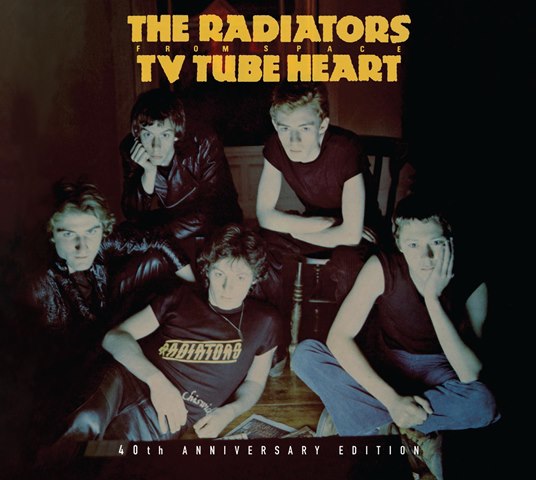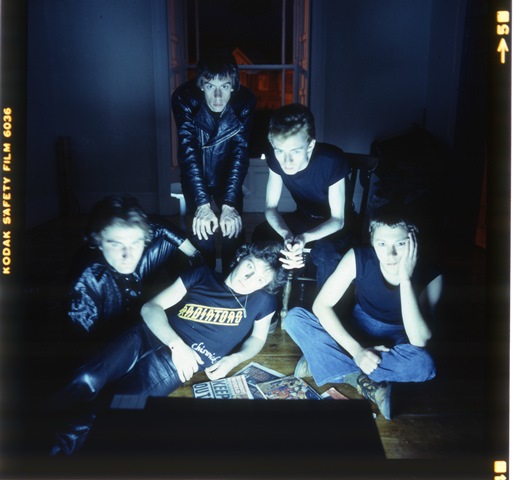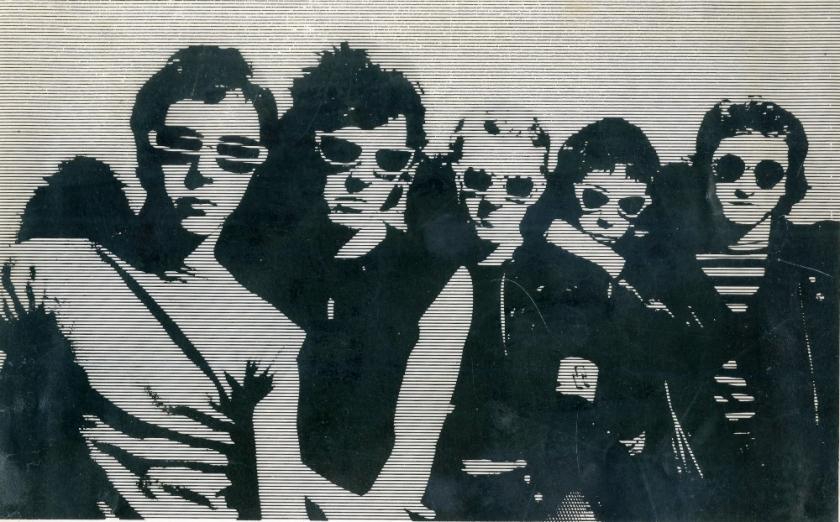TV Tube Heart, the debut album from The Radiators From Space, was issued on 21 October 1977, a week before the Sex Pistols’ Never Mind the Bollocks. Each was a punk rock album and one, inevitably, has been subjected to greater historical analysis and many more reissues than the other. Of course, Johnny Rotten and co’s first and only long-player was significant but the other band’s album was important too. The Radiators From Space were the Republic of Ireland’s first punk band –The Boomtown Rats, if they were punk at all, were relative Johnny-come-latelies – and TV Tube Heart remains a landmark.
The most important aspect of TV Tube Heart though is that it is stuffed with great songs. The album is crammed with tunes and influences are not hidden. T.Rex is in there. So are a love of doo-wop harmonies, formative pre-punk bands, Sixties mod-rock, The Ramones and white pre-Beatles’ pop. The Radiators From Space did not embrace a year-zero mentality and, as direct evidence, this new 40th Anniversary Edition re-release includes previously unheard cover versions of The Count Five’s “Psychotic Reaction”, The Creation’s “Try and Stop me” and The Flamin’ Groovies’ “Teenage Head”.
 Alongside the album’s original 13 tracks, the 40th Anniversary Edition collects their three non-album single sides, a raw and hugely enjoyable ten-track live-in-the studio session recorded on 22 June 1977, a couple of alternate versions and five live tracks recorded on cassette on 21 September 1977 at their first London show.
Alongside the album’s original 13 tracks, the 40th Anniversary Edition collects their three non-album single sides, a raw and hugely enjoyable ten-track live-in-the studio session recorded on 22 June 1977, a couple of alternate versions and five live tracks recorded on cassette on 21 September 1977 at their first London show.
They arrived in London as a four-piece and had first played as a quartet a month earlier after losing their singer Steve Rapid. He wanted to stay in Dublin and the band shuffled their line-up accordingly. Bar the 21 September live tracks, everything here was recorded with Rapid – this collection features the complete Chiswick label recordings of the Mark I Radiators From Space. Later, they shortened their name to The Radiators and made the superb Tony Visconti-produced Ghost Town album. Their guitarist/singer-songwriter Phil Chevron went on to join The Pogues.
It wasn’t easy being pioneering punks in Dublin, and it was made harder still by a sensationalist, hate-stoking popular media. The impressionistic liner notes give a clear sense of the strictures and tensions inherent to living in the Republic at the time, but they do not mention the awful and regrettably high-profile incident which almost made the band pack it in.
On 25 June 1977, The Radiators From Space were billed at Bellfield Burnin’, Dublin’s first punk festival. The Undertones were also booked for the university venue. Early on, while a band called The Vipers were playing, a fight broke out in the audience. A 19-year-old was stabbed and later died. The attending police homed in on The Radiators, who manifestly had nothing whatsoever to do with the violence. But they were punks. The muck-raking national newspaper The Sunday World picked up on it and attributed quotes such as “we should kill all old people” to the band. Their next single, issued in Ireland on 45 only (it was also on TV Tube Heart), was the caustic “Sunday World”.
 As its title makes clear, TV Tube Heart is concerned with the media and its influence – its deadening, pacifying influence as well as the power it has to influence. While “Sunday World” was written in reaction to the treatment they suffered, most of the songs were in their set before the August during which album was recorded. Beyond commenting on aspects of their country as they saw it, the band also took a wry look at the burgeoning punk trend with “Ripped and Torn” and “Roxy Girl”. They were well placed to be observers as they had played their first show (where their set included a Ramones’ cover, another Flamin' Groovies' song and a version of Them's “Gloria”) on 13 November 1976 supporting a visiting Eddie & The Hot Rods. Their roots were in a 1975 band called Greta Garbage & The Trash Cans. Eamon Carr, formerly of folk mavericks Horslips, was an early propagator.
As its title makes clear, TV Tube Heart is concerned with the media and its influence – its deadening, pacifying influence as well as the power it has to influence. While “Sunday World” was written in reaction to the treatment they suffered, most of the songs were in their set before the August during which album was recorded. Beyond commenting on aspects of their country as they saw it, the band also took a wry look at the burgeoning punk trend with “Ripped and Torn” and “Roxy Girl”. They were well placed to be observers as they had played their first show (where their set included a Ramones’ cover, another Flamin' Groovies' song and a version of Them's “Gloria”) on 13 November 1976 supporting a visiting Eddie & The Hot Rods. Their roots were in a 1975 band called Greta Garbage & The Trash Cans. Eamon Carr, formerly of folk mavericks Horslips, was an early propagator.
Heard now, TV Tube Heart is a little let down by its thin production but it still packs multiple punches. The track extracted as their second single is a fine entry point. “Enemies” is poppy yet driving and hard-edged, and features interweaving vocal harmonies (a-la the backing vocals on The Who’s “I Can’t Explain”), melodic and cleverly syncopated bass guitar. Melody Maker said, when reviewing the single, “the song is impressively strong.” New Musical Express pointed to a Small Faces' influence. Sounds declared it “quite invigorating.” In the UK, it was not a hit. In their home country, it went Top 20.
After their move to London, The Radiators From Space were paddling in a crowded pond and found it hard to make waves. Nonetheless, their first post-TV Tube Heart single, April 1978’s “Million Dollar Hero (in a Five and Ten Cents Store)”, was a striking, folk-edged mid-tempo performance which put them ahead of the pack. A year earlier, their own take on punk had also set themselves apart. The reissue of TV Tube Heart might get lost amongst the glut of punky 40th-anniversary reissues but if one less-familiar, underexposed album from 1977 needs seeking out – this is it.
- Next week: The BAFTA-winning Icelander Ólafur Arnalds' Eulogy For Evolution 2017, a 10th-anniversary reissue of his debut album
- Read more reissue reviews on theartsdesk















Add comment